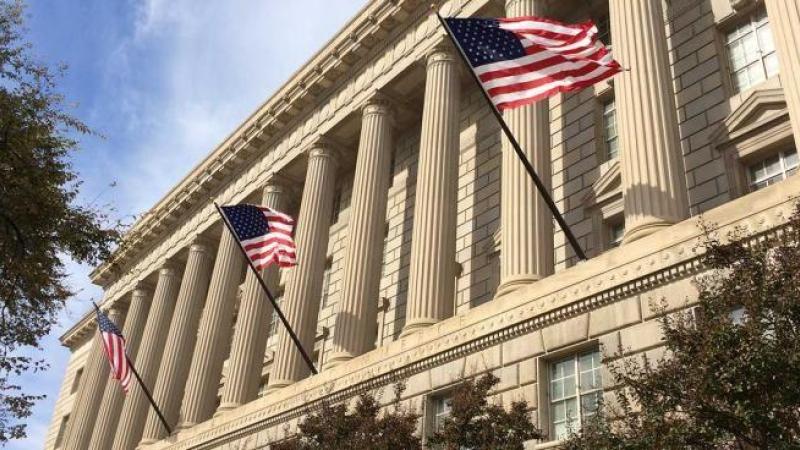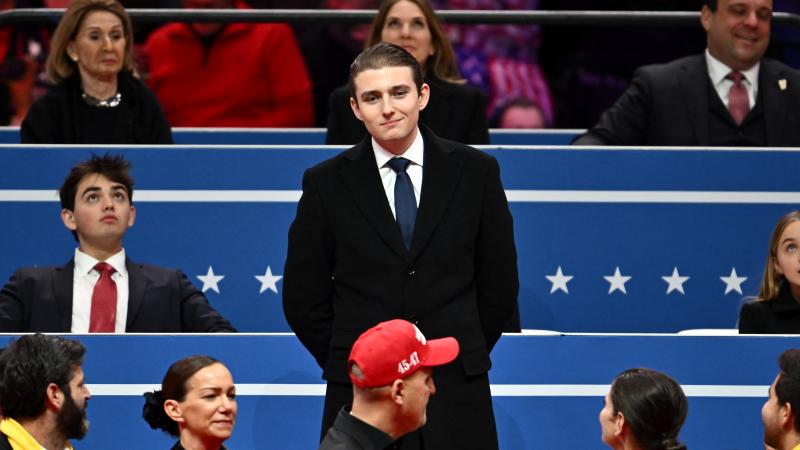Art of the Tariff Deal: Dozens of foreign powers negotiate for free trade instead of retaliation
Preliminary announcements from Trump himself and senior administration officials suggested that unlike China, dozens of key trading partners were prepared to negotiate favorable trade agreements to eliminate or at least reduce the tariffs.
Many politicians and policymakers predicted that Monday would be a “Black Monday.” While the equities market closed lower, the drops were at a lower pace than last week. In connecting the tariffs to the market's volatility, part of the evenness of Monday's trading came on the heels of news that numerous American trading partners agreed to negotiate with President Donald Trump and offered free trade deals to ratchet down his “reciprocal tariffs.”
Last Wednesday, which Trump dubbed “Liberation Day,” the president announced large-scale tariffs on nearly every country, declaring that the measures would help to end American trade deficits with foreign powers and bolster domestic production of goods. Thursday and Friday witnessed precipitous declines in the stock market, though the administration made clear it would hold the course.
Preliminary announcements from Trump himself and senior administration officials, moreover, suggested that many key trading partners were prepared to negotiate favorable trade agreements to eliminate or at least reduce the tariffs.
Talking to us
“Countries from all over the World are talking to us. Tough but fair parameters are being set. Spoke to the Japanese Prime Minister this morning. He is sending a top team to negotiate!” Trump posted on Truth Social. “They have treated the U.S. very poorly on Trade. They don’t take our cars, but we take MILLIONS of theirs. Likewise Agriculture, and many other ‘things.’ It all has to change, but especially with CHINA!!!”
In the meantime, Trump urged Americans to avoid being a “PANICAN” and to have patience with the market as it adjusted to the economic rebalancing.
“The United States has a chance to do something that should have been done DECADES AGO. Don’t be Weak! Don’t be Stupid! Don’t be a PANICAN (A new party based on Weak and Stupid people!). Be Strong, Courageous, and Patient, and GREATNESS will be the result!” he posted.
Evidently, at least some investors took his advice as key indices defied predictions of a precipitous fall and instead dropped only by modest amounts. The DOW Jones closed down 0.91%, while the Nasdaq rose 0.10%, and the S&P 500 dropped 0.23%.
More than 50 countries have asked to parley
Several Trump administration officials hit the airwaves over the weekend, shedding light on President Trump’s tariff strategy and indicating that negotiations are an important component of the plan. “So, the fact is, the countries are angry and retaliating and, by the way, coming to the table,” National Economic Council Director Kevin Hassett said during an interview with ABC News on Sunday.
He said that the tariffs imposed last week, so far, have spurred many countries to approach the administration to begin negotiations. “I got a report from the [U.S. Trade Representative] last night that more than 50 countries have reached out to the president to begin a negotiation,” Hassett said.
Treasury Secretary Scott Bessent said in an interview with NBC News on Sunday that the tariffs have allowed President Trump to create “maximum leverage for himself” in any trade negotiations. “More than 50 countries have approached the administration about lowering their non-tariff trade barriers, lowering their tariffs, stopping currency manipulation,” he said, echoing Hassett, but warned that talks could take time.
Some of the messaging out of the administration has been mixed, contributing to the confusion. Commerce Secretary Howard Lutnick suggested in an interview on Sunday that the tariffs were designed to do more than spur negotiations.
“There is no postponing. They are definitely going to stay in place for days and weeks. That is sort of obvious. The president needs to reset global trade,” Lutnick told CBS News. “Everybody has a trade surplus and we have a trade deficit. We are paying away our future and our lives. Come- the countries of the world are ripping us off, and it's got to end.”
Neither the U.S. Trade Representative nor the White House responded to requests for comment about which countries have approached Trump to negotiate a deal, but several have announced proposals publicly or are preparing negotiating teams.
"Europe is always ready for a good deal"
Many nations initially balked at the prospect of dropping their tariffs or making other concessions in response to American tariffs, and immediately went into public outrage. At the same time, some early actors have offered generous agreements and may be poised to quickly conclude their trade disputes as Trump appears eager to strike deals. Lenient terms, moreover, may prompt other nations to follow suit in pursuing economic rapprochements with Washington.
After initially vowing to impose retaliatory tariffs of its own, the European Union has quickly reversed course and publicly floated a proposal on Monday to wipe away all tariff barriers with the United States.
“We have offered zero-for-zero tariffs for industrial goods as we have successfully done with many other trading partners. Because Europe is always ready for a good deal. So we keep it on the table,” European Commission President Ursula Von der Leyen said at a press conference.
The EU currently tariffs several U.S. exports, including apparel, accessories, cotton and t-shirts at a 12% rate and vehicles at a 10% rate. Some Trump administration officials have also expressed frustration with EU value-added taxes (VAT) that increase the price of imported goods, but are not a traditional tariff.
Trump spoke with Prime Minister Shigeru Ishiba on Monday morning via video call. Trump’s own announcement indicated they had set the framework for a “tough, but fair” arrangement, though Ishiba stated that "Japan has been the biggest investor in the United States for five straight years and the tariff policies could hurt our Japanese companies' investment capabilities.”
Ishiba has further agreed to send a negotiating team to the United States in order to resolve the trade dispute. The country currently faces the prospect of a 24% tariff on all of its goods. Ishiba further suggested that he would present an arrangement to the Trump White House that would involve the expansion of Japanese purchases of American liquefied natural gas (LNG), cars, and agricultural products, Bloomberg reported.
“When we negotiate with the US we want to present a package. That will take some time, but we will make it a success,” he said. Treasury Secretary Scott Bessent on Monday confirmed he would lead the American negotiations and thanked the Japanese government for its “outreach and measured approach to this process.”
Israel, for its part, has moved to eliminate all of its tariffs on American goods, with Prime Minister Benjamin Netanyahu meeting with Trump on Monday at the White House.
“I recognize the position of the United States,” Netanyahu said. “It says, you know, ‘we're allowing other countries to put tariffs on us, but we don't put tariffs on them.’ And, you know, I'm a free trade champion, and free trade has to be fair trade.”
“And I think that's basically the position that you've put forward, Mr. President, we are going to eliminate the tariffs, and rapidly,” he vowed. “I ended up [with] the opportunity to speak to Secretary Lupin yesterday. We talked about how we could affect this quickly, and I hope to bring the solution very quickly. We're not talking about intentions. We're not talking about, you know, just words. We're talking about results.”
Other key American trading partners, including Vietnam, Canada, and Argentina, have expressed interest in negotiating lowered tariffs or the elimination of trade barriers altogether, though the European, Japanese and Israeli proposals still appear to be further along.
China's immediate reaction
The Chinese responded quickly to Trump’s tariffs by imposing their own 34% tariff on American imports in retaliation. Trump, however, has offered Beijing an exit strategy from the trade dispute by threatening to cut off all negotiations entirely should they fail to walk back the tariff. To back up his threat, he further warned of an additional 50% tariff on Chinese goods if they declined.
“[I]f China does not withdraw its 34% increase above their already long term trading abuses by tomorrow, April 8th, 2025, the United States will impose ADDITIONAL Tariffs on China of 50%, effective April 9th. Additionally, all talks with China concerning their requested meetings with us will be terminated!" he warned.
He reiterated his warning to Beijing during the Monday conference with Netanyahu, saying “I have great respect for China, but they can't do this with just, we're going to have one shot at this, and no other president is going to do this, what I'm doing, and I'll tell you what, it's an honor to do it, because we have been just destroyed, what they've done to our system.”
No pain, no gain
Trump’s efforts are not without drawbacks for the United States, especially in the short term. Major indices have plummeted in recent days and prompted many calls from supporters to ease off the more substantive tariffs. Nevertheless, the administration has signaled it will move forward and prominent supporters have pointed to the drops as necessary sacrifices to achieve long-term benefits.
“Is there going to be some short term pain? Yes, but that's him pushing back against the elites,” Utah state Rep. Trevor Lee, R, said on the Just the News, No Noise television show. “That's him pushing back against those who have these big corporate corporations heavily involved in the stock market.”
“And what this is going to do is not only help with the trade deficit, and quite frankly, the same tariffs he put on his first administration were kept on by the Biden administration, so they must have done something good there,” he added. “And long term, the stock market is going to rebound. It's going to be fine. It's not even lower than it's been the last eight years. It's still way up.”
During his press conference with Netanyahu, Trump addressed the tariff negotiations with the European Union and pointed to the need of constituent nations for American investment to keep their economies afloat. He particularly pointed to European need for American energy.
“The European Union has been very, very bad to us. They don't take our cars like Japan, in that sense, they don't take our agricultural product, they don't take anything practically, and yet, they said millions of cars in a year, Mercedes Benz, Volkswagen, BMWs,” he told reporters.
“They're sending millions and millions of cars into the US. But we don't have a car that's been sold to the European Union or other places. But let's go for the European Union, and it's not going to be that way,” he went on. “It's got to be fair and reciprocal. It's got to be fair. It's not fair. We have a deficit with the European Union of $350 billion and it's going to disappear fast," Trump said.
"And one of the reasons, and one of the ways that that can disappear easily and quickly, is they're going to have to buy our energy from us, because they need it.”
The Facts Inside Our Reporter's Notebook
Links
- stock futures
- Trump posted
- he posted
- DOW Jones
- Nasdaq rose 0.10%
- S&P 500
- Hassett said during an interview
- Bessent said in an interview
- Lutnick suggested in an interview
- public outrage
- initially vowing to impose retaliatory tariffs
- Ursula Von der Leyen
- currently tariffs several U.S. exports
- Ishiba stated
- Bloomberg reported
- Scott Bessent
- he warned
















